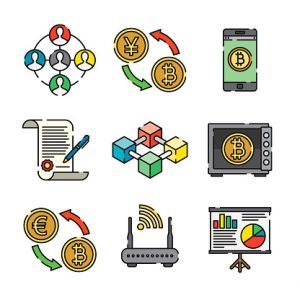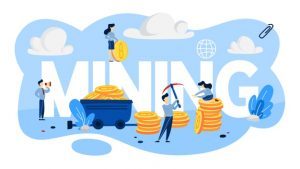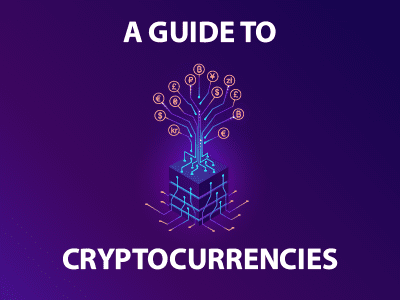A Guide to Cryptocurrencies
 Last Moment Tuitions
Last Moment Tuitions
Blog: A Guide to Cryptocurrencies.
Blockchain for Beginners: A Guide to Cryptocurrencies
We’ve compiled this beginner’s guide for the cryptocurrency enthusiasts out there! Here you can dig into the world of cryptocurrencies.
If you Google “what are cryptocurrencies?” you’ll get a variety of detailed answers.
Here’s a simple way to put it:
A cryptocurrency is a digital or virtual currency that is protected by encryption, making counterfeiting practically impossible. They are not issued by any central authority, making them immune to government intervention.
There were about 18.6 million bitcoins in circulation as of March 2021, with a total market valuation of roughly $927 billion.
Technically, Bitcoin consists of:
- A decentralized peer-to-peer network (the Bitcoin protocol
- A public transaction ledger (the blockchain)
- A set of rules for independent transaction validation and currency issuance (consensus rules)
- A mechanism for reaching global decentralized consensus on the valid blockchain (Proof-of-Work algorithm)
Now that you have a better grasp of cryptocurrencies, let’s have a look at how you may participate in this strategic journey!
It’s a chance to think about the future of cryptocurrencies and how they’ll affect our lives.
What Is Bitcoin Mining?
Bitcoin mining is the process of creating new bitcoins, an essential part of keeping the Bitcoin ledger up to date.

Miners are highly powerful computers that tackle complicated math problems in order to create new bitcoins. They’re in charge of verifying the legitimacy of Bitcoin transactions for which they get compensated.
How To Start Mining?
To get started with Bitcoin mining, you’ll need
- Purchase Bitcoin mining hardware or ASICs (Application Specific Integrated Circuits).
- Download Free Bitcoin Mining Software like CGminer and BFGminer which are command-line programs.
- Setup a Bitcoin wallet to store your Bitcoins.
- Join a Bitcoin Mining Pool. This mining pool is a group of miners that combine their computing power to earn more bitcoins.
- Mining rewards are given to the miner who solves a complex puzzle first. Miners are in charge of determining the legitimacy of Bitcoin transactions.
Let’s have a look at some more unique cryptocurrencies!
- Ethereum (ETH) is a Blockchain technology that has the potential to enable tamper-resistant smart contracts and apps. Many decentralised financial apps and contracts are powered by Ether, the network’s currency.
- Litecoin (LTC) is built on an open-source worldwide payment network that is not controlled by any central authority. Uses “scrypt” as proof of work.
- Polkadot (DOT) is a coin-based protocol that connects permissioned and permission-less blockchain, as well as oracles. It aims to provide interoperability across different blockchains.
Here are few Cryptocurrencies Payment Gateways to get you started…
 OpenNode
OpenNode- B2BinPay
- CoinPayments
- Blockonomics (Decentralized and Anonymous)
- CoinsBank
- BitPay
- NOWPayments
Since the beginning of this blog, we’ve been addressing the positives of cryptocurrencies such as transparency, security, efficiency, traceability, and cost reduction.
However, let’s take a look at some possible risks…
- Scalability – Bitcoin can only process seven transactions per second. Because each participant node must verify and approve a transaction, a Bitcoin exchange can take many hours.
- Privacy – Data on a public blockchain is encrypted and anonymous, yet it is accessible to all network nodes. As a result, everyone on the network has legal access to this information.
- Storage – With the increasing number of transactions, the size of the database will only expand, and there is no way personal computers can store unlimited data which just gets appended.
- Security – Satoshi Nakamoto highlighted the ‘51% attack’ when he launched Bitcoin. If 51% of the nodes in a network lie, the lie will have to be accepted as truth. Everyone in the network will have to keep a constant eye on it in order to detect any unwanted influence.
As blockchain technology becomes more widely adopted, these issues may be resolved over time. Developers and blockchain enthusiasts will undoubtedly find a way over these stumbling blocks because of the benefits they offer!
Scope of blockchain!

Governance: It ensures the transparency of public and allows auditing of government documents and that the document’s legality is preserved while decreasing the processing time.
Food & Supply Chain: It creates a tamper proof record to check the real information about expiration date, product journey from the farm to the shop.
Healthcare: Blockchain can help with patient data, consent forms, billing, and public health monitoring.
Tourism: Blockchain can help to minimise the time required to process passenger’s documents and creates a decentralised hotel booking environment while protecting guests’ personal information.
Conclusion
Many people are still unfamiliar with cryptocurrencies and need to be educated in order to be used in their daily life. People are increasingly using the internet for retail purchases, and someone needs to provide ways to transfer funds.
Overall, cryptocurrencies have a long way to go before they can completely replace credit cards and other currencies as a worldwide trade tool. Businesses need to start to accept it.
Want To Read More About This Discussion?







